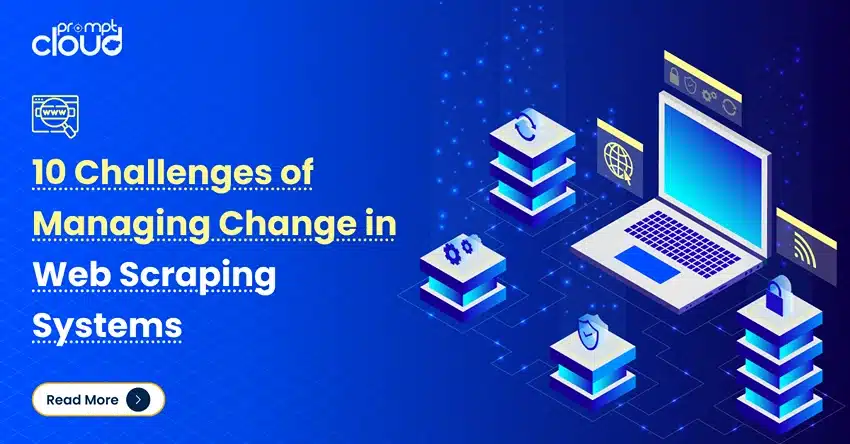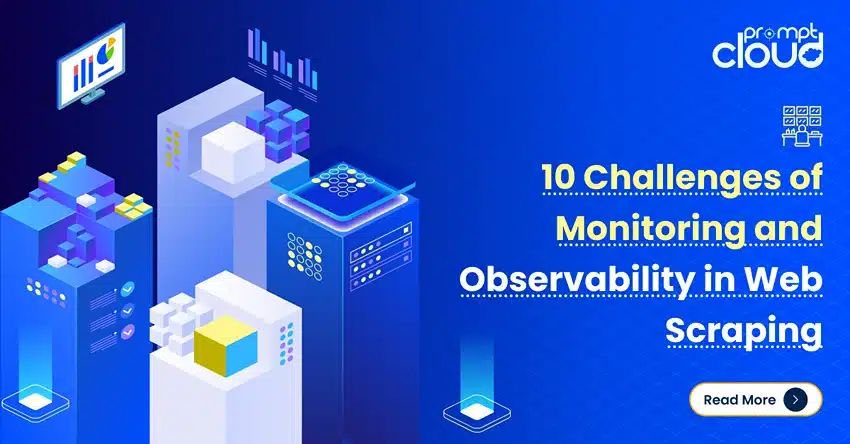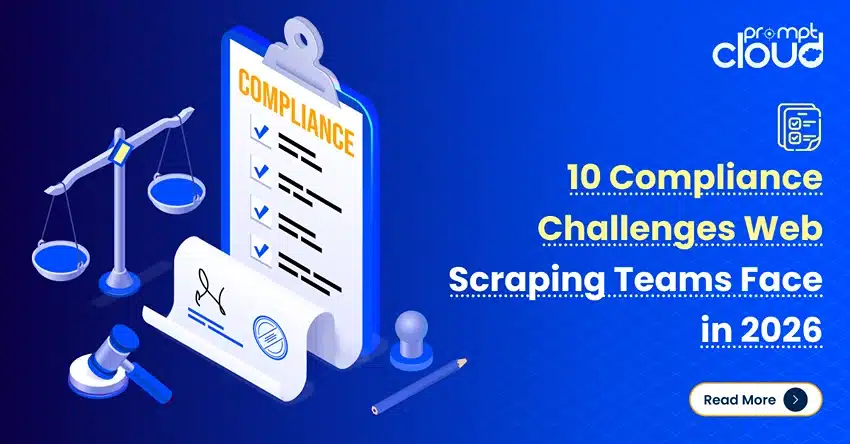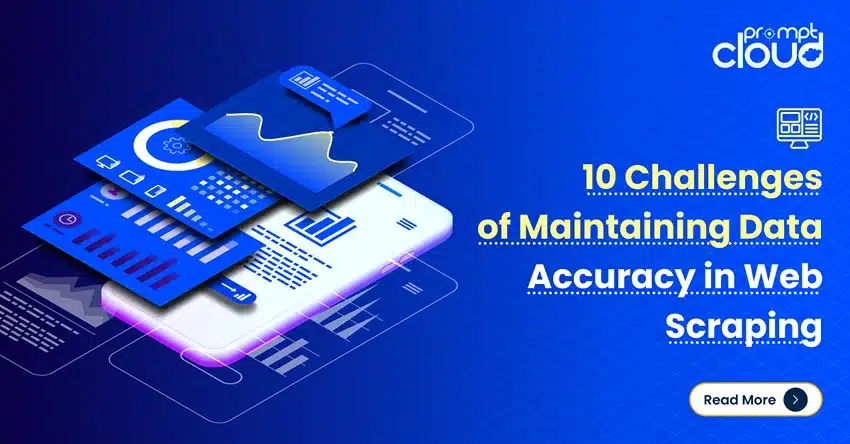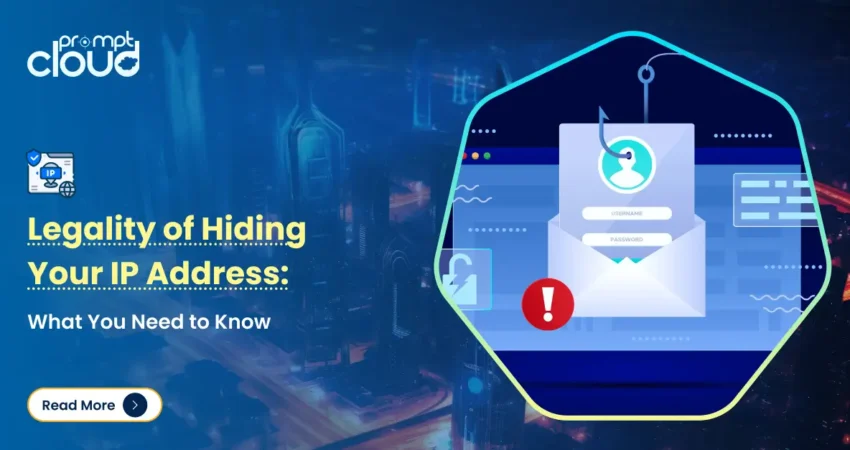
What is an IP Address and Why Would You Want to Hide It?
Let’s start with the basics. Every device that connects to the internet has something called an IP address. Think of it like your device’s home address on the internet, it tells websites and services where to send the data you’re asking for. Without it, nothing you do online would work.
But here’s the catch: your IP address also tells the world a lot more than you might realize. It can reveal your location, your internet service provider, and in some cases, it can even be used to track your online activity across websites.
That’s exactly why so many people, especially businesses handling sensitive data, choose to hide it.
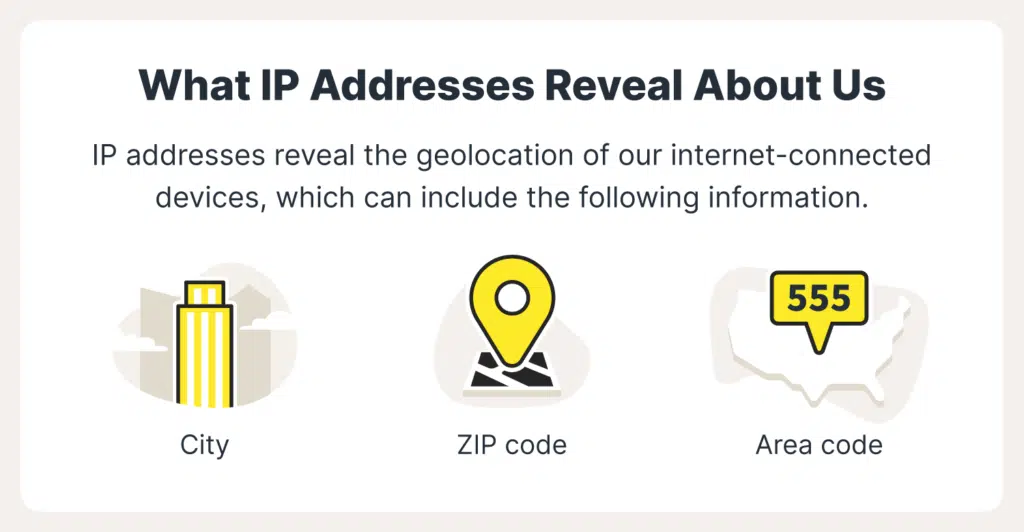
Image Source: The Daily VPN
Whether it’s to protect privacy, secure internal systems, or sidestep unnecessary tracking, hiding your IP has become a common practice. In fact, a 2024 report by Statista found that nearly 1 in 3 internet users globally now use some form of IP-masking tool like a VPN or proxy.
But here’s where it gets a bit murky. Just because people are doing it doesn’t mean it’s always allowed or wise. Is it legal to hide your IP address? Depends on your country. On how you’re using the tech. And sometimes, on who’s watching.
So let’s break it all down. We’ll look at how to hide your IP address, what tools people use (and how they work), where it’s legal, and what risks come with going anonymous online.
How to Hide Your IP Address (Real-World Tools That Actually Work)
If you’re trying to hide your IP address, you’re probably doing it for a good reason, maybe to avoid being tracked, maybe to secure your systems, or maybe just to stop ads from following you around. The good news? You’ve got options. And they’re not complicated.
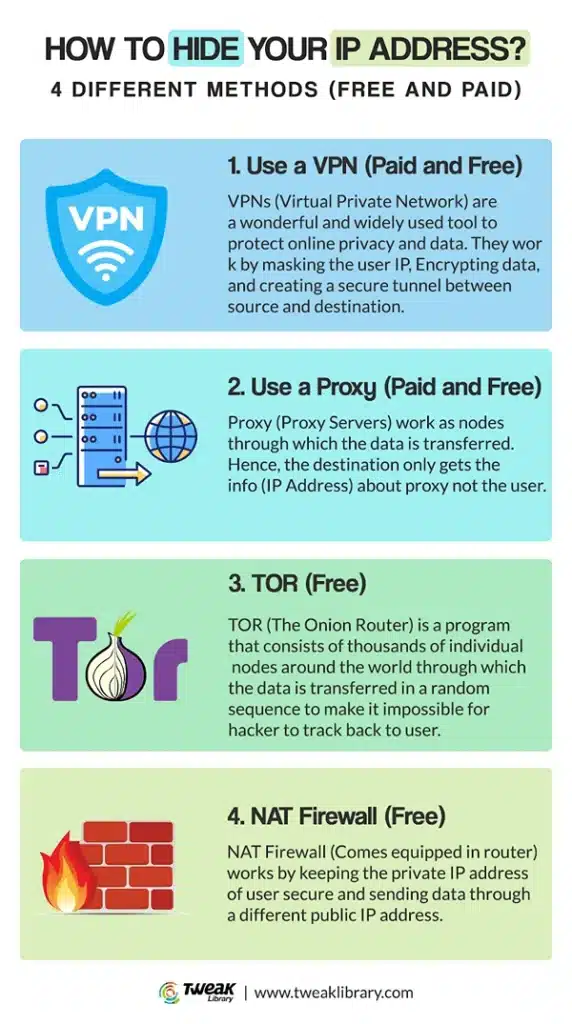
Image Source: Tweak Library
VPNs: Privacy with a Side of Encryption
A VPN is the go-to move for most people and for a lot of businesses too. When you connect through a VPN, your real IP is swapped out for one from a remote server, usually in another country. Everything you do online is encrypted before it leaves your device, which means no one (not even your ISP) can see what you’re up to.
It’s simple, effective, and widely used. Teams working remotely, especially with sensitive data, lean on VPNs to lock down access. It’s not just about privacy, it’s about control. You decide what gets seen, and by who.
Just avoid free VPNs unless you know exactly what they’re doing with your traffic. A lot of them track, log, and even sell your data, which defeats the point.
Proxies: Lightweight, but Limited
Proxies do a similar job; they sit between you and the internet, and the world sees their IP, not yours. They’re fast, easy to set up, and often used in automation-heavy tasks like scraping or managing multiple accounts.
But there’s a catch: most proxies don’t encrypt anything. So sure, your IP is hidden, but your data’s still out there for anyone with the right access to see. That might be fine for low-stakes activity, but it’s not great if you’re handling anything sensitive.
In short, proxies are useful tools, just don’t expect full-on privacy from them.
Tor: Built for Anonymity
Tor takes things further. It routes your traffic through a bunch of random servers around the world, encrypting each layer as it goes. By the time your request hits its final destination, it’s almost impossible to trace it back to you.
This is the choice for people who really need to stay anonymous, journalists, researchers, cybersecurity teams doing quiet recon. It’s powerful, but it’s not fast. And because of how it works, some websites block Tor traffic completely.
Still, when anonymity matters more than speed or convenience, nothing comes close.
Each of these tools hides your IP address in a different way. What matters is why you’re doing it. If it’s for security, VPNs are probably your best bet. For lightweight tasks or scraping? Proxies work fine. And if you’re serious about staying off the radar, Tor’s your tool.
Now let’s talk about the part most people skip: Is this actually legal?
Is It Legal to Hide Your IP Address? (It Depends on Where You Are and What You’re Doing)
Here’s the thing about hiding your IP address: the act itself usually isn’t illegal. But that doesn’t mean you’re off the hook. Like most things in tech, the tool isn’t the problem, it’s how you use it. And depending on where you are, even using the tool can raise eyebrows.
Let’s break this down by region and reality.
In the U.S.? You’re in the Clear, Mostly
In the United States, using a VPN, proxy, or Tor to hide your IP address is completely legal. Tons of companies use VPNs every day to protect internal data and keep remote work secure. And regular users? They’re using the same tools to stop advertisers, avoid trackers, or just watch a different version of Netflix.
What’s not legal? Using those tools to commit fraud, hack into systems, or hide your identity while breaking the law. If you’re using a VPN to do something illegal, the VPN doesn’t protect you; it just makes the legal consequences more complicated.
Europe: Pro-Privacy, But Still Has Rules
The European Union has some of the world’s strongest data protection laws. In fact, the whole idea of people having a right to online privacy is baked into the GDPR. So, yes, using a VPN or proxy to mask your IP address? Totally legal.
Where you might get into trouble is using those tools to violate service agreements, say, bypassing geo-restrictions on streaming platforms, or hiding your IP to scrape data from a site that doesn’t allow it. It’s not criminal in most cases, but it could still get you banned or sued.
China: Where Privacy Gets Complicated
In China, the situation is… different.
The Chinese government heavily regulates internet access. Using a VPN or any tool that hides your IP address without approval is technically illegal. The government maintains a whitelist of “approved” VPNs, mostly the ones they can monitor. Foreign VPN services are usually blocked, and using them can get you fined or worse.
For businesses operating in China, this creates a tough spot. You need to protect your data, but you also need to comply with local laws. That’s a tricky line to walk.
Russia: Similar Story, Different Flag
Russia also restricts access to VPNs and anonymity tools. Many foreign VPN providers are banned outright, and the government has passed laws requiring VPN companies to block access to content the government deems illegal.
Like in China, hiding your IP address isn’t inherently illegal, but if you’re doing it to access banned websites or apps, then you’re officially on the wrong side of the law.
The Middle East: Legal, But Watched Closely
In countries like the UAE or Saudi Arabia, VPNs are technically allowed, but if you use them to break the law, even unintentionally, penalties can be harsh.
For example, using a VPN to access voice-over-IP services that are blocked locally (like Skype or WhatsApp calls) might land you in legal trouble. Fines in the UAE can go up to hundreds of thousands of dollars if authorities decide you crossed a line.
The tools are legal. But the usage? That’s what matters here.
So what’s the takeaway?
Hiding your IP address is usually legal, but using that hidden IP to do something shady or illegal isn’t. And depending on where you are in the world, just using the tool could be seen as a red flag.
The key is knowing the laws in your country and making sure your privacy practices aren’t crossing any lines you can’t afford to cross.
Up next: let’s talk about the why behind hiding your IP and when it makes sense (and when it doesn’t).
When Hiding Your IP Address Makes Sense (And When It Doesn’t)
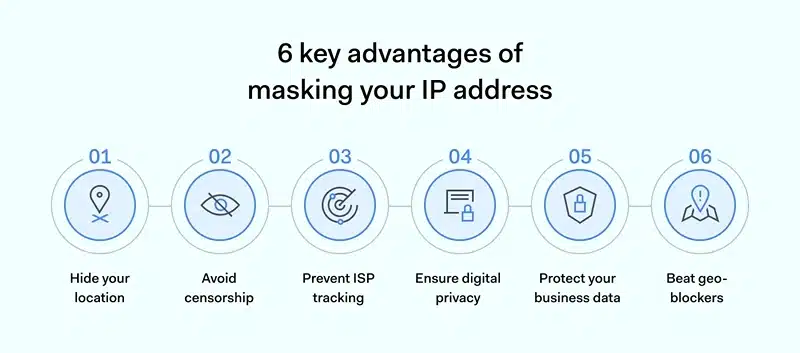
Image Source: NordLayer
Just because you can hide your IP address doesn’t mean you always should. There are plenty of situations where it’s a smart, even necessary, move. But there are also times when it crosses into ethically gray territory or just flat-out shady behavior.
So let’s draw a line between smart privacy practices and, well… the stuff that gives cybersecurity folks a headache.
When It’s Justified, Even Smart
If you’re running a business that handles sensitive data, finance, healthcare, e-commerce, or anything with customer records, hiding your IP address is less about secrecy and more about control.
Using a VPN, for example, gives your remote teams a secure connection back into your network. It keeps client data out of the wrong hands and adds a layer of protection against targeted attacks. In a world where ransomware and phishing campaigns are still running rampant, this kind of setup isn’t just smart, it’s table stakes.
Even for individuals, there are legit reasons to mask your IP. Maybe you don’t want advertisers following you around the web. Maybe you’re accessing information from a country that blocks certain sites. Or maybe you’re a security researcher who doesn’t want your IP tied to your recon. All of that? Totally reasonable.
In some cases, think journalists reporting from hostile regions or activists protecting their identity, hiding an IP address can actually be a safety issue. It’s not just about privacy, it’s about survival.
When It’s Questionable, Or Flat-Out Wrong
But then there’s the flip side.
Using a VPN to bypass copyright blocks and stream content you’re not licensed to watch? Technically, a terms-of-service violation. Not exactly a federal crime, but not squeaky clean either.
Scraping data from a site that specifically bans scraping or spamming platforms from a masked IP? That’s where you leave the “privacy” lane and start drifting into abuse.
And if you’re hiding your IP to launch attacks, phish users, or hide your tracks after stealing data, yeah, that’s just criminal.
There’s also the trust issue. If you’re constantly hiding your IP without a clear reason, it might raise red flags, especially on platforms that rely on IP-based verification to prevent fraud. In some industries, it’s not about legality; it’s about perception. Hiding your IP without context can make you look like you’ve got something to hide.
The bottom line? Hiding your IP isn’t inherently good or bad. It’s a tool. And like any tool, it depends on how and why you use it.
Used the right way, it protects your systems, your people, and your data. Used the wrong way, it opens the door to legal risks, damaged reputations, and broken trust.
Next up, we’ll walk through the potential risks and tradeoffs that come with going invisible online, because there’s more to it than flipping a switch and vanishing.
Risks and Tradeoffs of Hiding Your IP Address
Hiding your IP address can give you a real advantage when it comes to privacy and control, but it’s not without downsides. Whether you’re a business trying to secure internal traffic or just someone who wants a little digital breathing room, it’s important to know what you might be giving up in the process.
Security Isn’t Always a Guarantee
One of the biggest misconceptions about hiding your IP is that it automatically makes you secure. Not quite.
A VPN, for example, hides your IP and encrypts your traffic, which is great, but only if you’re using a VPN you can trust. Free VPNs? A lot of them log your data, sell it to third parties, or get hit with leaks they don’t tell you about. That’s not security, that’s just swapping one kind of exposure for another.
The same goes for proxies. Most don’t encrypt anything, and if you’re routing sensitive data through one, you could be opening the door to man-in-the-middle attacks or data interception.
Bottom line: hiding your IP can improve your security, but only when paired with the right tool and smart usage. It’s a piece of the puzzle, not the whole picture.
You Might Be Breaking Terms of Service
Let’s say you’re using a VPN to access a site that’s geo-blocked. Technically, it works — but you might also be violating that site’s terms of service. Platforms like Netflix, Spotify, and even some online marketplaces have policies that ban location spoofing. If they catch on, your account can get flagged or banned.
The same goes for web scraping or data automation. Even if you’re scraping public data through a proxy, doing so from a masked IP can still go against a site’s rules. And if they decide to take legal action, hiding your IP won’t necessarily protect you.
In other words, just because you’re hidden doesn’t mean you’re immune.
Government Scrutiny Is a Real Thing
This one’s especially important if you or your business operates internationally.
In some regions, China, Russia, and parts of the Middle East, the use of VPNs and similar tools is heavily monitored or even restricted. You might be doing something perfectly innocent, like connecting to your corporate servers, but if local laws prohibit VPN use without permission, that can turn into a legal issue fast.
Even in countries where VPNs are legal, government agencies may keep an eye on traffic coming from tools like Tor or certain proxy networks. Just the use of these tools can sometimes flag you as suspicious, even if you’re not doing anything wrong.
Anonymity Can Work Against You
In some cases, hiding your IP might hurt your experience more than help it.
Certain websites or apps may block access entirely if they detect VPN or proxy traffic. You might run into endless CAPTCHA loops, login challenges, or locked accounts, especially if you’re using shared IPs from crowded servers.
It can also mess with legitimate services that use IP data for location-based access or personalization. For example, trying to book a flight or access regional pricing while appearing to be in five different countries within 20 minutes? That’ll raise some flags.
To sum it up: hiding your IP address is useful, sometimes essential, but it’s not a free pass.
It can improve your privacy and protect your data, but it can also put you at odds with platform rules, government regulations, and even basic user experience. Before you go all-in, know what kind of risks you’re comfortable with, and make sure the tool you’re using is actually built for what you need.
Now, let’s wrap this up and answer the real question: Should you be hiding your IP address at all?
So… Should You Hide Your IP Address?
Here’s the honest answer: it depends.
If you’re running a business that deals with sensitive data, operates across borders, or handles client information, you absolutely can’t afford to leak. Then yes, hiding your IP address is a smart, proactive move. It’s not about being sneaky; it’s about reducing attack surfaces, protecting internal systems, and keeping control over how and where your traffic moves.
If you’re an individual just looking for more privacy online, trying to get out from under the weight of constant tracking, ad targeting, or geo-restrictions, that’s also a fair reason. Everyone deserves a little digital breathing room.
But, and this matters, the tool isn’t magic. A VPN doesn’t make you invisible. A proxy won’t fix bad security practices. Tor can offer deep anonymity, but it won’t make illegal activity legal. You still have to be smart, informed, and aware of the laws where you live and work.
The better question isn’t “should you hide your IP address”, it’s- why are you doing it, and are you doing it responsibly?
Because when used the right way, tools like VPNs, proxies, and Tor don’t just protect you, they help build a safer internet. One where users have more control, companies reduce risk, and privacy doesn’t have to feel like a luxury.
So yes, hide your IP if you need to. Just don’t hide from the responsibility that comes with it.
Want More Control Over Your Data Strategy?
Whether you’re hiding your IP address for privacy, security, or compliance, the truth is, it’s just one part of a much bigger picture.
At PromptCloud, we help businesses take that control even further. From enterprise-grade web scraping infrastructure to custom proxy and IP rotation solutions, we make it easy to access the data you need: safely, reliably, and at scale.
Need to collect geo-targeted data without getting blocked? We’ve got you. Want to protect your scraping infrastructure from bans or detection? We can help you stay under the radar without crossing any ethical lines.
Security, flexibility, and control – all built in.If your team is working on a data-heavy project and needs more than just off-the-shelf solutions, we’re here to talk. Reach out and let’s build something tailored to your goals.









